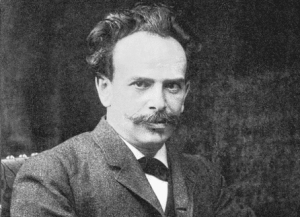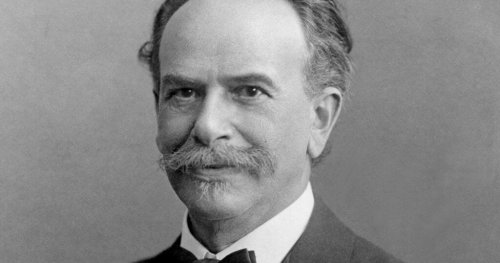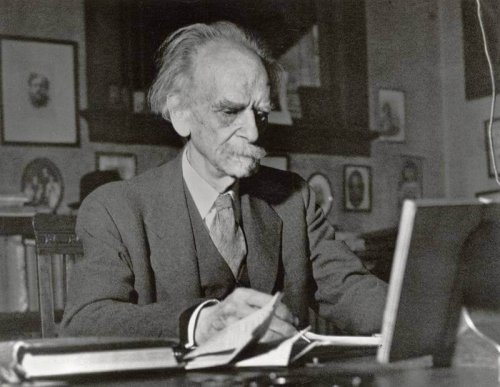Franz Boas: The Father of Modern Anthropology

Franz Boas (1858-1942) was a German anthropologist. In 1888, he founded the first university department of anthropology in North America at Clark University. He was also responsible for establishing a more scientific method of studying anthropology by requiring more extensive fieldwork.
In today’s article, you’ll learn more about the circumstances that led Franz Boas to create this new and meticulous scientific discipline. We’ll also talk about the personal and social circumstances that inspired Boas to study this particular field of social science.
Boas discovers anthropology
Like many anthropologists of his day, Boas was born and educated in Germany. When he was 20, he began studying physics and math. He got his doctorate in geography in 1881. His dissertation was titled: “Contributions to the Understanding of the Color of Water”.
In 1883, he went on an expedition to the Arctic Ocean to study the color of its waters. He stayed there for an entire year, living among Inuits and whalers. It was there that he discovered ethnography and direct observation as a method to study social phenomena. He also discovered the importance of understanding the context of the study subject.
His close relationship with the Arctic Inuits sparked his interest in anthropology. He decided to focus primarily on fieldwork but he wanted to study every aspect of anthropology, including linguistics and the social and cultural sphere. He understood very early on that language and culture play a more important role in societies than natural conditions.
When he finished his expedition, he returned to Berlin. A few years later, however, he returned to North America to give classes at Clark University. By 1889, he was a professor at Columbia University, where he worked for the rest of his life. Boas was also a conservationist at the American Museum of Natural History in the Ethnology section.

Franz Boas’ most important contributions to anthropology
Franz Boas made many contributions to the field of anthropology. However, you could say that he made major contributions to the establishment of anthropology as a science, acting as a professor, researcher, administrator, and institution founder.
He wrote many different scientific books and articles, covering the entire range of anthropological subjects. Boas discussed linguistics, ethnological theory, anthropometry, folklore, racial problems, and civil rights… The list goes on.
Boas was at the center of important events that marked a before and after in the world of North American anthropology. He was involved in the modernization of the American Anthropologist journal (1889) and he helped start the American Anthropologist Association in 1900. He also helped found the American Folklore Society in 1888 and participated in the revitalization of the American Ethnological Society in 1900.
In 1910, he played an active role in establishing the International School of American Archeology and Ethnology in Mexico. He was the director of the institution between 1911 and 1912.
One of Franz Boas’ most important theoretical contributions to anthropology was a new perspective on the study of culture. His theory rejected the prevailing idea at the time about lineal social evolution. Instead, he proposed a relativist view of cultural differences. That encouraged anthropologists to focus more on the particularities of each society instead of comparing cultures and making speculative generalizations.
Franz Boas educated a generation of anthropologists
Another important contribution Boas made to anthropology were his disciples. Boas and his students built the foundations of professional, university anthropology by getting rid of the amateurs and hobbyists. In fact, they were able to establish ethnographic field research as the most important part of anthropological professionalization.
Some of his most famous disciples were Ruth Benedict, Margaret Mead, Alfred Kroeber, Robert Lewie, and Edward Sapir, among others. They were all part of a movement to spread anthropology across the North American continent. Kroeber and Lewie went to the University of California, Berkeley, Sapir to the University of Chicago, and Mead and Benedict stayed at Columbia University.
His reflections on race

In 1911, Boas published his book The Mind of Primitive Man. Many people consider it to be the prolific author’s greatest achievement. Within its pages, Boas tried to clarify the relationships between culture and race and concludes that there’s no direct and effective relationship between the two. As a result, he rejected the idea that there are inferior and superior races and the idea that you can talk about primitive vs. civilized peoples based on a phenotype that characterizes a particular society.
Boas defended this theoretical position all his life. In 1931, he published an article in German that said that contrary to what the ultranationalist movement believed: that culture has nothing to do with race. He published his article a year before Hitler took power in Germany and his work was later publicly burned in Kiel, Germany.
Franz Boas (1858-1942) was a German anthropologist. In 1888, he founded the first university department of anthropology in North America at Clark University. He was also responsible for establishing a more scientific method of studying anthropology by requiring more extensive fieldwork.
In today’s article, you’ll learn more about the circumstances that led Franz Boas to create this new and meticulous scientific discipline. We’ll also talk about the personal and social circumstances that inspired Boas to study this particular field of social science.
Boas discovers anthropology
Like many anthropologists of his day, Boas was born and educated in Germany. When he was 20, he began studying physics and math. He got his doctorate in geography in 1881. His dissertation was titled: “Contributions to the Understanding of the Color of Water”.
In 1883, he went on an expedition to the Arctic Ocean to study the color of its waters. He stayed there for an entire year, living among Inuits and whalers. It was there that he discovered ethnography and direct observation as a method to study social phenomena. He also discovered the importance of understanding the context of the study subject.
His close relationship with the Arctic Inuits sparked his interest in anthropology. He decided to focus primarily on fieldwork but he wanted to study every aspect of anthropology, including linguistics and the social and cultural sphere. He understood very early on that language and culture play a more important role in societies than natural conditions.
When he finished his expedition, he returned to Berlin. A few years later, however, he returned to North America to give classes at Clark University. By 1889, he was a professor at Columbia University, where he worked for the rest of his life. Boas was also a conservationist at the American Museum of Natural History in the Ethnology section.

Franz Boas’ most important contributions to anthropology
Franz Boas made many contributions to the field of anthropology. However, you could say that he made major contributions to the establishment of anthropology as a science, acting as a professor, researcher, administrator, and institution founder.
He wrote many different scientific books and articles, covering the entire range of anthropological subjects. Boas discussed linguistics, ethnological theory, anthropometry, folklore, racial problems, and civil rights… The list goes on.
Boas was at the center of important events that marked a before and after in the world of North American anthropology. He was involved in the modernization of the American Anthropologist journal (1889) and he helped start the American Anthropologist Association in 1900. He also helped found the American Folklore Society in 1888 and participated in the revitalization of the American Ethnological Society in 1900.
In 1910, he played an active role in establishing the International School of American Archeology and Ethnology in Mexico. He was the director of the institution between 1911 and 1912.
One of Franz Boas’ most important theoretical contributions to anthropology was a new perspective on the study of culture. His theory rejected the prevailing idea at the time about lineal social evolution. Instead, he proposed a relativist view of cultural differences. That encouraged anthropologists to focus more on the particularities of each society instead of comparing cultures and making speculative generalizations.
Franz Boas educated a generation of anthropologists
Another important contribution Boas made to anthropology were his disciples. Boas and his students built the foundations of professional, university anthropology by getting rid of the amateurs and hobbyists. In fact, they were able to establish ethnographic field research as the most important part of anthropological professionalization.
Some of his most famous disciples were Ruth Benedict, Margaret Mead, Alfred Kroeber, Robert Lewie, and Edward Sapir, among others. They were all part of a movement to spread anthropology across the North American continent. Kroeber and Lewie went to the University of California, Berkeley, Sapir to the University of Chicago, and Mead and Benedict stayed at Columbia University.
His reflections on race

In 1911, Boas published his book The Mind of Primitive Man. Many people consider it to be the prolific author’s greatest achievement. Within its pages, Boas tried to clarify the relationships between culture and race and concludes that there’s no direct and effective relationship between the two. As a result, he rejected the idea that there are inferior and superior races and the idea that you can talk about primitive vs. civilized peoples based on a phenotype that characterizes a particular society.
Boas defended this theoretical position all his life. In 1931, he published an article in German that said that contrary to what the ultranationalist movement believed: that culture has nothing to do with race. He published his article a year before Hitler took power in Germany and his work was later publicly burned in Kiel, Germany.
All cited sources were thoroughly reviewed by our team to ensure their quality, reliability, currency, and validity. The bibliography of this article was considered reliable and of academic or scientific accuracy.
- Boas, F. (2008). Franz Boas: textos de antropología: Introducción, selección de textos, traducción y notas de Alfredo Francesch Díaz. Editorial Universitaria Ramón Areces.
- Boas, F. (1912). Notes on Mexican Folk-Lore. The Journal of American Folklore, 25(97), 204-260.
- Valdés Gázquez, M. (2006). El pensamiento antropológico de Franz Boas. Universidad Autónoma de Barcelona.
This text is provided for informational purposes only and does not replace consultation with a professional. If in doubt, consult your specialist.







